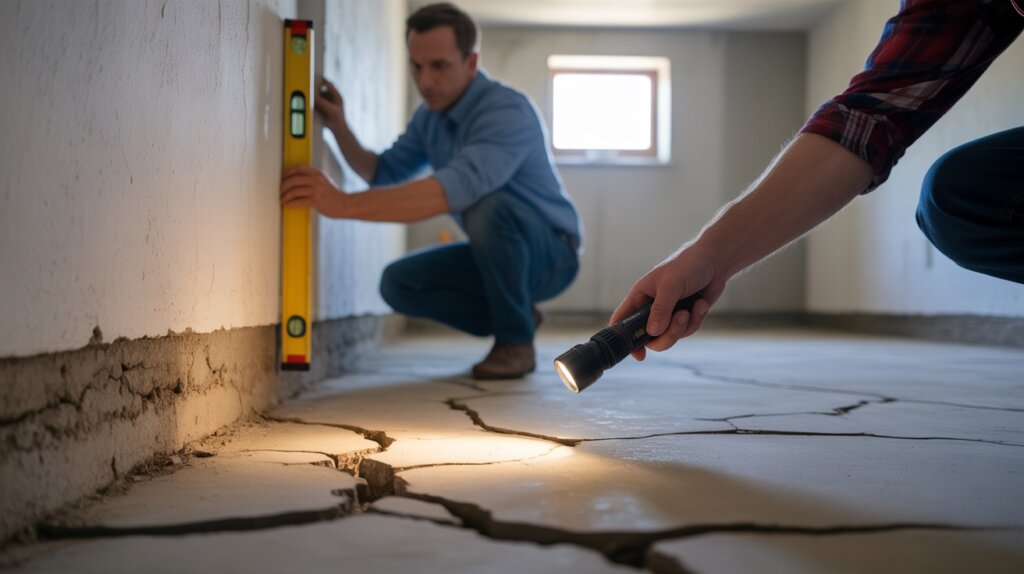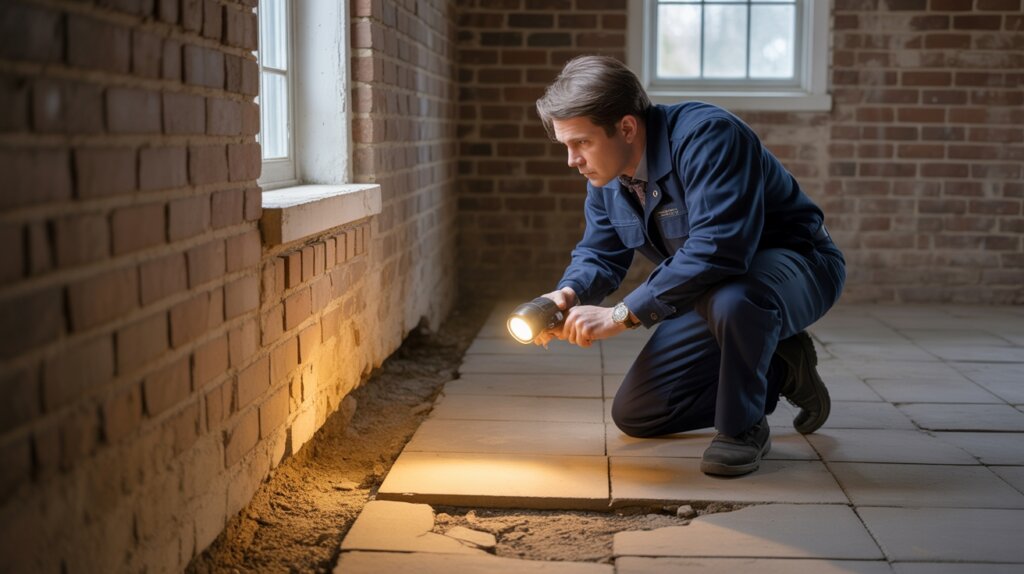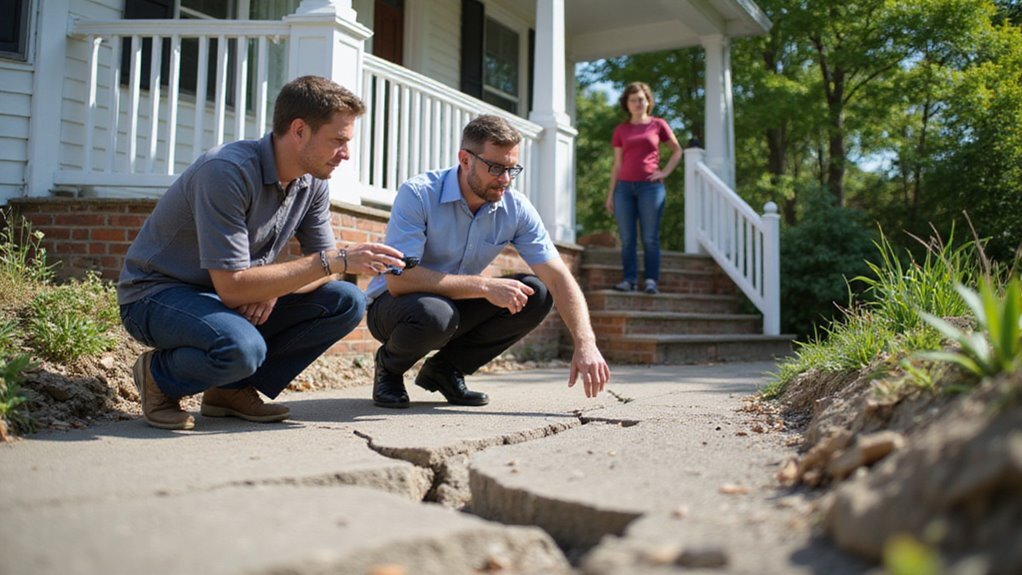Selling a house with foundation problems can be stressful and complicated. Many buyers worry about hidden costs and future repairs. Home inspections often highlight these issues, making sales less likely to close.
These inspections can derail deals and lower your home’s value. Buyers may walk away or demand steep discounts. Lenders might also hesitate to approve loans for homes with serious foundation concerns.
The best way to handle this is to understand how inspections affect your sale and prepare accordingly. Home inspections can make or break your chances of selling a house with foundation problems.
Knowing what to expect helps you stay in control and negotiate better. This blog will guide you with clear steps to address foundation issues and succeed in your home sale.
Key Takeaways
- Home inspections reveal the extent and cause of foundation problems, enabling accurate assessment and repair planning before listing.
- Inspection reports provide documentation for required disclosures, reducing legal risks and establishing transparency with potential buyers.
- Identified foundation issues in inspections often prompt buyers to negotiate for lower prices or request repair credits.
- Thorough inspections help sellers price their home realistically, minimizing surprises during negotiations and the closing process.
- Detailed inspection findings can reassure buyers or lenders, aiding financing approvals and streamlining the transaction.
Understanding Foundation Problems in Residential Properties

Foundation problems matter when selling a home because they affect safety, value, and buyer confidence. Buyers and inspectors pay close attention to the structure. If your foundation has issues, you may lose money or have trouble closing the sale. Addressing foundation issues early can help preserve your property’s worth and facilitate a smoother transaction. Poor drainage and weak soil often cause foundation problems.
Water around the foundation can make soil move, creating cracks or uneven floors. If buyers see these issues, they might offer less or walk away. Fixing drainage and soil stability can protect your home’s value. Additionally, accurate market value assessments are crucial to ensure you set a realistic price that reflects your home’s condition. If you handle these problems before selling, you can avoid surprises later. A strong foundation helps ensure a smooth sales process.
Common Signs of Foundation Issues
You’ll want to watch for visible wall cracks, uneven floors, and sticking doors or windows—each signals potential foundation distress. These symptoms can indicate differential settlement or structural shifting, which often impacts property value and buyer confidence. Identifying these warning signs early positions you to take informed, strategic action in today’s competitive real estate market.
Additionally, understanding the importance of a clear title can help ensure the legal transfer of property once repairs are addressed. Recognizing home sale strategies that address foundation issues can facilitate smoother transactions and better financial outcomes.
Visible Wall Cracks
Visible wall cracks can be a sign of foundation problems. Inspectors look closely at these cracks when you sell your home. Serious cracks may lower your property value.
Diagonal or stair-step cracks near windows and doors may show the foundation is settling unevenly. Vertical cracks from floor to ceiling can mean the foundation is shifting or sinking. These types of cracks often need professional repair.
If you see large or growing cracks, you should call a foundation expert. Cosmetic repairs will not fix real structural issues. Minor surface cracks may not be serious, but bigger ones should never be ignored.
Uneven Floors Detected
Uneven floors often mean there are problems with the foundation. Inspectors see sloping, sagging, or bouncy floors as warning signs. These issues usually happen when soil under the house shifts or weakens.
Home inspectors use tools to check if floors are level. They look for dips or changes in height. If they find uneven spots, it could mean the house’s structure is at risk.
If buyers or lenders see these problems, they may worry about the home’s safety. You might have to fix the foundation before selling. Addressing the cause can help protect your home’s value.
Sticking Doors and Windows
Sticking doors and windows are often early signs of foundation problems. These issues happen when the home’s framing is no longer square. Even small foundation shifts can cause doors and windows to jam or not close properly.
Differential settlement means one part of the foundation sinks more than another. If this happens, doors and windows can become misaligned. Poor drainage or missing waterproofing makes these problems worse by allowing soil to shift.
Home inspectors and buyers see sticking doors and windows as warning signs. Recurring issues may point to deeper structural problems. If left untreated, these problems can lower your home’s value.
Why Home Inspections Are Essential When Selling
You need a professional home inspection to identify hidden structural deficiencies that aren’t visible during casual walkthroughs. Accurate inspection reports establish a credible property value baseline, protecting your negotiation position. By providing full transparency, you’ll foster buyer confidence and streamline transaction timelines.
Additionally, understanding the types of liens that may affect the property can help you address potential legal challenges early in the selling process. Recognizing potential undisclosed liens ensures you are prepared to resolve legal issues that could otherwise delay or jeopardize the sale.
Revealing Hidden Structural Issues
Home inspections reveal hidden structural problems in a house. These issues, like cracks or uneven floors, may not be visible at first. If left unchecked, they can cause serious and expensive damage.
Inspectors look for signs of foundation trouble, such as moisture or settling. If they find problems, owners can fix them before selling. Proper repairs protect your investment and help inform buyers.
If you repair foundation issues and keep records, buyers may feel more secure about the home. This can lead to smoother negotiations. Early action on these problems builds trust and avoids surprises later.
Establishing Property Value Baseline
A professional inspection helps you know your home’s true value. Inspectors find both visible and hidden problems, including foundation issues. This gives you a clear starting point for pricing your property.
The inspector provides technical details about the foundation’s condition. If there are cracks or uneven floors, these get documented. This information helps you set a fair price and avoid costly mistakes.
If you fix any problems early, you can avoid surprises during negotiations. Buyers will trust your transparency if you share inspection results. A formal inspection also helps you prepare all needed disclosures.
Your home’s value will match its real condition if you address any foundation issues. Proper documentation supports your asking price. If you have foundation problems, clear reports are especially important.
Building Buyer Trust
Buyers need to trust the information they get about a home. Clear home inspections show honesty and professionalism. If you fix foundation issues and give detailed disclosures, you help buyers feel more secure.
Inspection reports and seller disclosures help lower buyer worries and make talks easier. A home warranty can also reduce the risk buyers may feel about foundation repairs. If you are open about any problems, buyers will see you as honest.
When sellers share all the facts, buyers are more likely to make an offer. Trust is very important when selling homes with structural issues. This approach can lead to a smoother and faster sale.
What Inspectors Look for in Foundation Assessments
During a foundation assessment, inspectors check if the property is safe and stable. They look for cracks, uneven floors, and damp areas. These signs can show foundation problems. Properly addressing these issues early can prevent costly repairs later. Inspectors also check if doors and windows are difficult to open or close.
They look for gaps between walls and ceilings. Any of these issues may mean the foundation has moved. If there are signs of trouble, inspectors may suggest a soil test. Poor soil or drainage can make the foundation unstable. They also review how water drains around the building.
Understanding foundation issues and how they are diagnosed can help sellers manage repairs before listing. Inspectors keep detailed records of what they find. This paperwork is important if you need to prove the foundation is solid. Fixing these problems early can help sell your home faster.
How Foundation Problems Affect Home Valuation

A compromised foundation lowers your home’s market value. Buyers worry about structural safety and future repair costs. Appraisers usually lower the home’s value to reflect these risks. Conducting a thorough foundation inspection can help clarify the extent of the problems and guide your selling strategy. Proper documentation and expert evaluations are critical to providing transparent repair estimates, which impact both valuation and negotiations.
Homes with foundation issues are harder to sell. Many buyers avoid them because of uncertainty and extra expenses. If the home stays on the market, it may receive lower offers. Foundation problems decrease your home’s value, as buyers and appraisers factor in safety risks and potential repair expenses.
Lenders may refuse loans or reduce the amount if the foundation is a concern. Sellers often have to lower the price or give credits for repairs. These challenges make it difficult to get the price you want.
If you understand these effects, you can set a fair price. You should also be prepared for longer selling times and tough negotiations.
Types of Foundation Repairs Noted During Inspections
During an inspection, you’ll often encounter specific foundation repairs such as crack repairs and sealing, pier and beam adjustments, and slab leveling solutions. Each method addresses distinct structural concerns and can significantly influence buyer confidence and property value.
Understanding these repair types helps you foresee negotiation points and market your home more effectively. Additionally, knowing the market analysis process can help you set a realistic price that appeals to cash buyers willing to pay a fair price quickly. Recognizing the importance of home condition and how it aligns with buyer expectations can help you prioritize repairs and improvements strategically.
Crack Repairs and Sealing
Foundation cracks are usually fixed by repairs and sealing. These methods help stop water from getting in and slow further damage. Inspectors look at cracks to check your home’s structure.
Cracks can be vertical, horizontal, or stair-step. Each pattern gives clues about how the foundation is handling stress. If cracks are big or spreading, there may be a structural risk.
Inspectors also look at the type of repair used. Epoxy injection and polyurethane sealant are common choices for sealing cracks. Good repairs can make your home seem more stable to buyers.
If repairs look recent, inspectors may wonder about ongoing movement or leaks. Visible repairs can affect how much buyers trust the home. The quality of the work will also show if more repairs may be needed later.
Pier and Beam Adjustments
A pier and beam foundation can shift, sag, or become damaged by moisture. Inspectors check for uneven floors, sticking doors, or wood rot under the house. These signs show there may be movement or deterioration in the foundation.
If inspectors find these issues, they may suggest repairs such as reinforcing the foundation or adjusting the piers. Common solutions include sistering beams, shimming, or replacing damaged piers. Each method helps restore stability and keeps the structure safe.
Early repairs can prevent bigger problems later. Fixing these issues can make your home more attractive to buyers. If you address them before selling, you may get better offers and smoother negotiations.
Slab Leveling Solutions
Inspectors look for uneven floors and cracks to decide if slab leveling is needed. They also check doors and windows for misalignment. These signs show possible problems with the soil under the slab.
Inspectors use tools like laser levels and moisture meters to measure changes. If they find major settling, they suggest solutions such as mudjacking or foam injection. Slab piers may also be recommended for serious issues.
You may qualify for grants or repair help if repairs are needed. These solutions can lower your costs and boost home value. Proactive fixes also make buyers feel more confident.
Inspectors will note any settlement that could weaken the structure. They will also record issues with soil or moisture. Their report will list the best repair options for your situation.
Disclosure Requirements for Foundation Defects
When you sell a home with foundation defects, you must tell buyers about these problems. Most states require you to share information on all major foundation issues. This includes cracks, settling, or any repairs done to the foundation. Proper documentation and disclosures help protect you from legal issues and build trust with buyers.
If you do not disclose these defects, you could face lawsuits or have the sale canceled. Proper forms should explain the problem and list any repairs, like soil work or extra supports. Buyers want honesty, and missing details can hurt your reputation. If you follow the disclosure laws, you lower your risk of legal trouble.
Clear paperwork helps buyers trust you. It also makes the sale process smoother for everyone. Understanding disclosure requirements is essential to ensure a smooth transaction when selling a home with foundation problems. Additionally, being transparent about title issues and remedies can further facilitate a successful sale.
Impact on Buyer Confidence and Negotiations

When you disclose foundation issues, you directly influence buyer trust and set the stage for transparent negotiations. Buyers often adjust their risk tolerance and may utilize these disclosures to strengthen their bargaining position. You’ll notice that market dynamics shift, frequently resulting in lower offers or demands for repair credits. Engaging a professional appraiser or seasoned real estate agent can help you accurately assess your home’s value and navigate these discussions effectively.
Trust in Property Disclosure
Buyers trust the information you provide about a property. Accurate disclosure of foundation problems builds this trust. If you are honest, buyers feel more comfortable making a decision.
Full disclosure helps buyers understand what they are buying. It also protects you from legal trouble after the sale. If you disclose all issues, the sale process often moves faster.
Clear information lets appraisers set a fair value for the property. Buyers can then compare your home to others on the market. If you are transparent, buyers may make stronger offers and avoid price disputes.
Bargaining Power Dynamics
Clear disclosure of foundation issues can give you more control in negotiations. If you are honest about problems, buyers know what to expect. This reduces the chance of surprises during the sale.
Buyers who stay interested after learning about foundation issues are usually serious. These buyers understand the home’s condition and are less likely to ask for big discounts. If you address concerns early, you help keep negotiations fair.
Being upfront may also help your home stay attractive in the market. Buyers appreciate honesty and are more likely to trust your terms. This approach supports smoother and more open conversations about price.
Risk Perception Changes
Clear disclosure affects how buyers see risk in a home sale. If a home inspection finds foundation issues, buyers worry more about repairs. This worry often causes buyers to rethink their interest and be cautious.
Buyers may ask for more detailed inspections if they notice problems. They could take longer to decide and might negotiate harder. Lower offers are common because buyers expect extra repair costs.
If you understand these changes, you can respond to buyer concerns early. Addressing issues quickly helps protect the deal. This approach can also make the sales process smoother.
Repair vs. Selling As-Is: Weighing Your Options
If you have foundation problems, you must choose between repairing them or selling your home as-is. Repairs can increase your home’s value, but selling as-is is faster and may attract investors. Your choice depends on your budget, goals, and market conditions.
A licensed engineer should inspect your foundation first. The engineer’s report will explain the problem and help you plan your next steps. If repairs are possible, you can hire a trusted contractor with a transferable warranty.
Repairs may help you ask for a higher price, but they cost money and take time. If you sell as-is, you will likely get lower offers. Homes with foundation problems can sell for 15-30% less than similar homes.
You should compare repair costs with the possible selling price. If repairs are too expensive, selling as-is might be better. Always check local market trends before making your final decision.
Working With Real Estate Agents on Problematic Foundations
Selling a house with foundation problems is difficult. An experienced real estate agent can help you handle these challenges. The agent’s knowledge makes the selling process easier and safer.
The agent will recommend a professional structural assessment. This step helps you understand repair options and their impact on price. If you know the facts, you can make better decisions.
A good agent also helps with legal disclosures. They make sure you follow the rules and avoid legal trouble. If you are unsure, always ask your agent for advice.
Agents use accurate pricing models that reflect repair costs and market trends. They can connect you with trusted contractors for honest reports. If buyers have concerns, your agent will negotiate to protect your interests.
Choosing the right agent can help you sell your house for the best price, even with foundation issues.
Attracting Buyers Despite Foundation Damage
Foundation damage can make it harder to attract buyers. If you market the home well, you can still find interested buyers. Focus on sharing clear details about the damage and what caused it.
Provide any inspection reports or engineer notes about the foundation. If you have repair estimates or plans, share those with buyers. Accurate information builds trust and can attract buyers who see value in fixing the problem.
Target investors or buyers who are looking for a project. If the property has a good location or large lot, point out these features. If buyers know the damage can be fixed, they may see a good opportunity.
Always be honest about the issues and potential costs. If you show that the damage is manageable, buyers are more likely to make offers. Proper documentation and clear communication increase your chances of a sale.
Financing Challenges for Homes With Foundation Issues
Securing financing is much harder when a home has foundation problems. Lenders see these homes as risky and may say no to loans. Some lenders will only offer loans with higher costs or special rules.
Most lenders want proof that a professional fixed the foundation. They might delay giving money until repairs are done. Mortgage insurers may also refuse to cover the home, adding more risk.
Insurance companies often will not insure homes with foundation issues. If they do, coverage may be limited or cost more. Buyers often offer less money because of extra repair and insurance costs.
If you want to buy or sell a house with foundation problems, expect strict rules and fewer loan options. You might have to use special loans that cost more. If you fix the foundation first, financing becomes much easier.
Legal Considerations When Selling With Known Problems
If you sell a house with known problems, you must tell the buyer about them. Most places have laws that require you to disclose all major defects. These rules protect buyers from hidden issues.
Sellers usually fill out a form listing any known problems, like foundation damage. If you hide these issues, the buyer can take legal action. You could face lawsuits, canceled sales, or fines.
Buyers may claim you lied or committed fraud if problems show up later. Honest communication helps both you and the buyer avoid trouble. If you are unsure what to share, ask a real estate lawyer for advice.
Keep records of repairs, inspections, and expert opinions about the problem. These documents can help answer buyer questions and show you acted in good faith. Following these steps can lower your legal risk.
Tips for Smoother Transactions With Foundation Concerns
Buyers often worry about homes with foundation issues. If you handle these concerns before listing, sales negotiations will go more smoothly. You can avoid delays by preparing in advance. Address foundation concerns before listing to ease buyer worries and ensure a smoother, faster sales negotiation process.
A certified structural engineer should inspect the property and explain any damage. The engineer can suggest repair or reinforcement options. If you follow these recommendations, buyers will feel more confident.
Always provide a recent engineering report to show current foundation status. Include copies of all repair invoices and contractor information. You should also offer a transferable structural warranty if possible.
If you share full details about past and present repairs, buyers will trust your honesty. These steps help you look credible and make negotiations easier. If you use these tips, you can sell your home with fewer problems.
Conclusion
If you need to sell a house with foundation problems, a home inspection offers valuable clarity. If you understand the issues early, you can disclose them and avoid last-minute surprises. If buyers know what to expect, they are more likely to trust you.
If you want to avoid repairs or long negotiations, selling for cash could be a good solution. If you choose a cash buyer, you can often close quickly and avoid extra costs. If you work with a professional team, you will have guidance at every step.
If you are ready to sell, we at Greg Buys Houses can help. If you contact us, we can give you a fair cash offer today. Let us make selling your house simple and stress-free.

